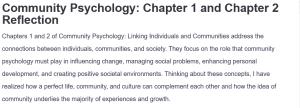Community Psychology: Chapter 1 and Chapter 2 Reflection
Chapters 1 and 2 of Community Psychology: Linking Individuals and Communities address the connections between individuals, communities, and society. They focus on the role that community psychology must play in influencing change, managing social problems, enhancing personal development, and creating positive societal environments. Thinking about these concepts, I have realized how a perfect life, community, and culture can complement each other and how the idea of community underlies the majority of experiences and growth.
Acquisition of New Knowledge
The most compelling concepts drawn from these chapters are the concepts of connectedness between individuals and their communities. As a field of study, community psychology has argued that the welfare of an individual cannot be separated from the welfare of the community because people can only develop optimally when they feel a sense of belonging and mutual support (Espinosa & Verney, 2020). The chapters also clarified the difference between locality and relational communities, highlighting how both contribute to individuals’ sense of connection through physical proximity or shared interests. Four architectural elements in the sense of community, including membership, influence, integration, and shared emotional connection, also support these factors in enhancing a supportive, fulfilling environment for the people and groups (Chaulagain et al., 2024).
Reflection
Reading these chapters clarified my past experiences, particularly regarding the impact of inclusion and exclusion. There were periods in which I realized I felt excluded from communities since everyone around me spoke a different language or had a different culture. I needed to be a part of those communities. The reflection highlights the importance of fostering belonging and ensuring equal access within community spaces (Marques et al., 2020). Understanding that positive, productive societies are constructed with acceptance and shared respect solidifies the need to ensure that all individuals from all backgrounds feel accepted and valued in their communities (Hamed, 2023). These conditions influence who individuals are and how well one is empowered to live.
Application
This knowledge will help my development by promoting belongingness and inclusion in my current and future communities. For now, I have set up goals that involve thinking and acting with more empathy, encouraging everyone to voice their opinion in organizational and social circles, respectively. In the future, I aspire to incorporate these values in leadership positions, developing policies and practices that create a supportive environment for the community’s members and enhance the common good. For instance, I would like to organize everyday community activities to help people with different backgrounds meet, get more resources, and help each other.
Conclusion
Evaluating these chapters has enriched my knowledge of how much individual and community welfare are intertwined. Through community psychology’s lens, it is crucial to create a community that will define the conditions necessary for various individuals to feel needed and involved. This knowledge reaffirms my standpoint to actively contribute something positive to any society I am part of, understanding that bonds of any society need to be fostered to enhance inclusiveness.
References
Chaulagain, S., Li, J., & Pizam, A. (2024). The impact of sense of community on residents’ satisfaction, behavioral intentions, and life satisfaction in senior living communities. International Journal of Hospitality Management, 121, 103822. https://doi.org/10.1016/j.ijhm.2024.103822
Espinosa, P. R., & Verney, S. P. (2020). The underutilization of community‐based participatory research in psychology: A systematic review. American Journal of Community Psychology, 67(3–4), 312–326. https://doi.org/10.1002/ajcp.12469
Hamed, A. (2023). The well-living paradigm: Reimagining quality of life in our turbulent world. Discover Global Society, 1(1). https://doi.org/10.1007/s44282-023-00022-8
Marques, B., Freeman, C., Carter, L., & Pedersen Zari, M. (2020). Sense of place and belonging in developing culturally appropriate therapeutic environments: A review. Societies, 10(4), 83. https://doi.org/10.3390/soc10040083
ORDER A PLAGIARISM-FREE PAPER HERE
We’ll write everything from scratch
Question
Chapter 1 and Chapter 2
Textbook:
- Community Psychology – Linking Individuals and Communities (Kloos Hill Thomas Wandersman Elias Dalton (Third Edition) –
- Chapter 1 & 2
Now that you have completed chapters one and two, please reflect and complete a post with the following questions in mind…
-
- How would you define an ideal personal life?
- How would it be related to community and society?
- What core values would guide this life?
- How would you define an ideal community?
- How would it enable a good life for individuals? Families?
- What organizations would exist in this community? Why?
- What would be the core values of this community? Why?
- How would you define an ideal society?
- How would it enable a good life for individuals, families and communities?
- What would be core values of this society? Why?
- Define and distinguish between locality and relational communities and give your own examples of each.
- Define the four elements of a sense of community as defined by McMillan and Chavis.
- Identify a time in your life when you felt you were excluded, or treated unjustly, by a community. How did that happen, and how did it affect you?
- Do you think that sense of community, or community ties, are declining in your society? Why?
- What types of communities are declining? What types of communities are growing? Why?
- Can you cite evidence or examples from the chapter or elsewhere to support your points?
Community Psychology: Chapter 1 and Chapter 2 Reflection
Your submission should not be a summary of the chapter; instead you will discuss your experiences acquiring the new knowledge (Key points that stood out for you). Secondly, have you found clarity for some past event, belief, or experience having acquired this knowledge (Reflection). Lastly, how will this new knowledge impact your overall development—currently and in the future? (Application) Please remember to provide examples to support your ideas.


